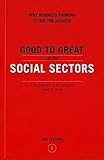Good to great in the social sector
I like Jim Collins.
Built to Last and Good to Great are classics in business literature—full of transferable principles for fueling dynamic movements.
I've recently finished Good to Great and the Social Sectors, Jim's contribution to what greatness looks like in the not-for-profit world. The good and great news is he rejects the notion that to be great, churches need to be more like businesses.
Here's a taste:
We must reject the idea—well-intentioned, but dead wrong—that the primary path to greatness in the social sectors is to become “more like a business.†Most businesses—like most of anything else in life—fall somewhere between mediocre and good. Few are great. When you compare great companies with good ones, many widely practiced business norms turn out to correlate with mediocrity, not greatness. So, then, why would we want to import the practices of mediocrity into the social sectors?
I shared this perspective with a gathering of business CEOs, and offended nearly everyone in the room. A hand shot up from David Weekley, one of the more thoughtful CEOs—a man who built a very successful company and who now spends nearly half his time working with the social sectors. “Do you have evidence to support your point?†he demanded. “In my work with nonprofits, I find that they’re in desperate need of greater discipline—disciplined planning, disciplined people, disciplined governance, disciplined allocation of resources.â€
“What makes you think that’s a business concept?†I replied. “Most businesses also have a desperate need for greater discipline. Mediocre companies rarely display the relentless culture of discipline—disciplined people who engage in disciplined thought and who take disciplined action—that we find in truly great companies. A culture of discipline is not a principle of business; it is a principle of greatness.â€
Later, at dinner, we continued our debate, and I asked Weekley: “If you had taken a different path in life and become, say, a church leader, a university president, a nonprofit leader, a hospital CEO, or a school superintendent, would you have been any less disciplined in your approach? Would you have been less likely to practice enlightened leadership, or put less energy into getting the right people on the bus, or been less demanding of results?†Weekley considered the question for a long moment. “No, I suspect not.â€
That’s when it dawned on me: we need a new language. The critical distinction is not between business and social, but between great and good. We need to reject the naïve imposition of the “language of business†on the social sectors, and instead jointly embrace a language of greatness.

“Good to Great and the Social Sectors: A Monograph to Accompany Good to Great†(Jim Collins)

